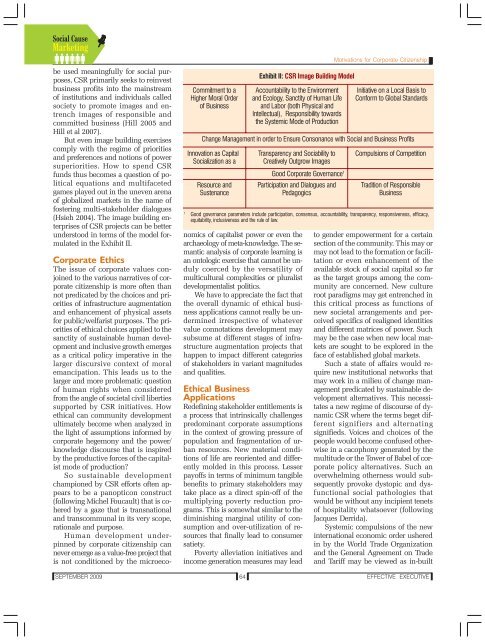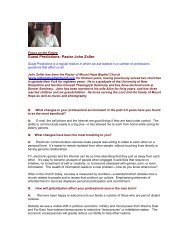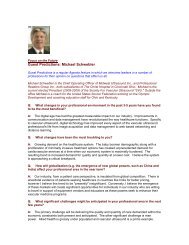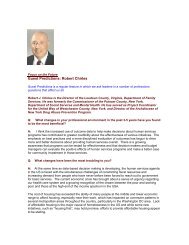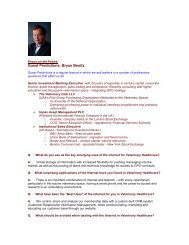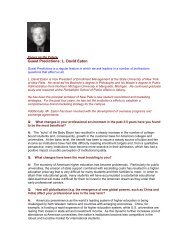Social Cause Marketing - The Regis Group Inc
Social Cause Marketing - The Regis Group Inc
Social Cause Marketing - The Regis Group Inc
Create successful ePaper yourself
Turn your PDF publications into a flip-book with our unique Google optimized e-Paper software.
e used meaningfully for social purposes,<br />
CSR primarily seeks to reinvest<br />
business profits into the mainstream<br />
of institutions and individuals called<br />
society to promote images and entrench<br />
images of responsible and<br />
committed business (Hill 2005 and<br />
Hill et al 2007).<br />
But even image building exercises<br />
comply with the regime of priorities<br />
and preferences and notions of power<br />
superiorities. How to spend CSR<br />
funds thus becomes a question of political<br />
equations and multifaceted<br />
games played out in the uneven arena<br />
of globalized markets in the name of<br />
fostering multi-stakeholder dialogues<br />
(Hsieh 2004). <strong>The</strong> image building enterprises<br />
of CSR projects can be better<br />
understood in terms of the model formulated<br />
in the Exhibit II.<br />
Commitment to a<br />
Higher Moral Order<br />
of Business<br />
Exhibit II: CSR Image Building Model<br />
Accountability to the Environment<br />
and Ecology, Sanctity of Human Life<br />
and Labor (both Physical and<br />
Intellectual), Responsibility towards<br />
the Systemic Mode of Production<br />
Initiative on a Local Basis to<br />
Conform to Global Standards<br />
Change Management in order to Ensure Consonance with <strong>Social</strong> and Business Profits<br />
Innovation as Capital<br />
<strong>Social</strong>ization as a<br />
Resource and<br />
Sustenance<br />
Transparency and Sociability to<br />
Creatively Outgrow Images<br />
Good Corporate Governance 1<br />
Participation and Dialogues and<br />
Pedagogics<br />
Compulsions of Competition<br />
Tradition of Responsible<br />
Business<br />
1<br />
Good governance parameters include participation, consensus, accountability, transparency, responsiveness, efficacy,<br />
equitability, inclusiveness and the rule of law.<br />
Corporate Ethics<br />
<strong>The</strong> issue of corporate values conjoined<br />
to the various narratives of corporate<br />
citizenship is more often than<br />
not predicated by the choices and priorities<br />
of infrastructure augmentation<br />
and enhancement of physical assets<br />
for public/welfarist purposes. <strong>The</strong> priorities<br />
of ethical choices applied to the<br />
sanctity of sustainable human development<br />
and inclusive growth emerges<br />
as a critical policy imperative in the<br />
larger discursive context of moral<br />
emancipation. This leads us to the<br />
larger and more problematic question<br />
of human rights when considered<br />
from the angle of societal civil liberties<br />
supported by CSR initiatives. How<br />
ethical can community development<br />
ultimately become when analyzed in<br />
the light of assumptions informed by<br />
corporate hegemony and the power/<br />
knowledge discourse that is inspired<br />
by the productive forces of the capitalist<br />
mode of production?<br />
So sustainable development<br />
championed by CSR efforts often appears<br />
to be a panopticon construct<br />
(following Michel Foucault) that is cohered<br />
by a gaze that is transnational<br />
and transcommunal in its very scope,<br />
rationale and purpose.<br />
Human development underpinned<br />
by corporate citizenship can<br />
never emerge as a value-free project that<br />
is not conditioned by the microeconomics<br />
of capitalist power or even the<br />
archaeology of meta-knowledge. <strong>The</strong> semantic<br />
analysis of corporate learning is<br />
an ontologic exercise that cannot be unduly<br />
coerced by the versatility of<br />
multicultural complexities or pluralist<br />
developmentalist politics.<br />
We have to appreciate the fact that<br />
the overall dynamic of ethical business<br />
applications cannot really be undermined<br />
irrespective of whatever<br />
value connotations development may<br />
subsume at different stages of infrastructure<br />
augmentation projects that<br />
happen to impact different categories<br />
of stakeholders in variant magnitudes<br />
and qualities.<br />
Ethical Business<br />
Applications<br />
Redefining stakeholder entitlements is<br />
a process that intrinsically challenges<br />
predominant corporate assumptions<br />
in the context of growing pressure of<br />
population and fragmentation of urban<br />
resources. New material conditions<br />
of life are reoriented and differently<br />
molded in this process. Lesser<br />
payoffs in terms of minimum tangible<br />
benefits to primary stakeholders may<br />
take place as a direct spin-off of the<br />
multiplying poverty reduction programs.<br />
This is somewhat similar to the<br />
diminishing marginal utility of consumption<br />
and over-utilization of resources<br />
that finally lead to consumer<br />
satiety.<br />
Poverty alleviation initiatives and<br />
income generation measures may lead<br />
Motivations for Corporate Citizenship<br />
to gender empowerment for a certain<br />
section of the community. This may or<br />
may not lead to the formation or facilitation<br />
or even enhancement of the<br />
available stock of social capital so far<br />
as the target groups among the community<br />
are concerned. New culture<br />
root paradigms may get entrenched in<br />
this critical process as functions of<br />
new societal arrangements and perceived<br />
specifics of realigned identities<br />
and different matrices of power. Such<br />
may be the case when new local markets<br />
are sought to be explored in the<br />
face of established global markets.<br />
Such a state of affairs would require<br />
new institutional networks that<br />
may work in a milieu of change management<br />
predicated by sustainable development<br />
alternatives. This necessitates<br />
a new regime of discourse of dynamic<br />
CSR where the terms beget different<br />
signifiers and alternating<br />
signifieds. Voices and choices of the<br />
people would become confused otherwise<br />
in a cacophony generated by the<br />
multitude or the Tower of Babel of corporate<br />
policy alternatives. Such an<br />
overwhelming otherness would subsequently<br />
provoke dystopic and dysfunctional<br />
social pathologies that<br />
would be without any incipient tenets<br />
of hospitality whatsoever (following<br />
Jacques Derrida).<br />
Systemic compulsions of the new<br />
international economic order ushered<br />
in by the World Trade Organization<br />
and the General Agreement on Trade<br />
and Tariff may be viewed as in-built<br />
SEPTEMBER 2009<br />
64<br />
EFFECTIVE EXECUTIVE


